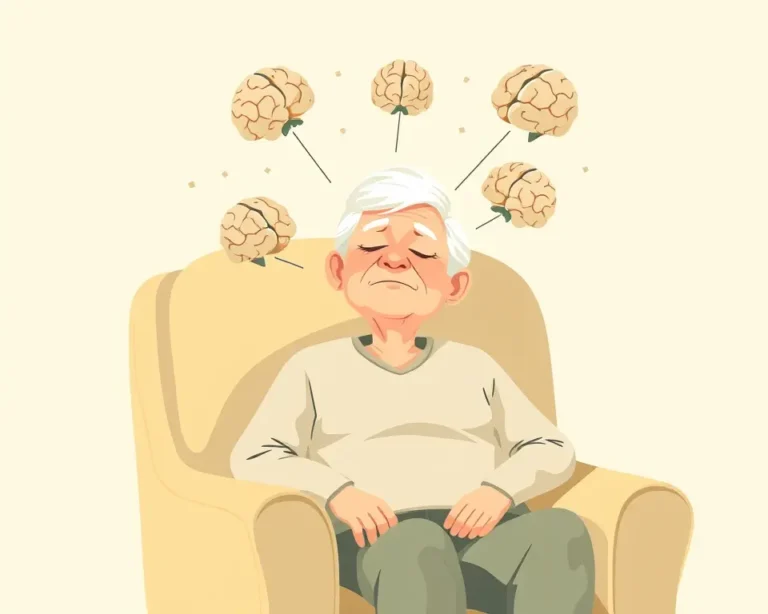Retirement should be a time of relaxation and enjoyment, but it can also bring unexpected challenges, including a decline in cognitive function and increased mental fatigue. Fortunately, research suggests that regular exercise can be a powerful tool for retired adults to combat mental fatigue and maintain their cognitive sharpness.
The Link Between Exercise and Mental Fatigue in Older Adults
Recent studies have highlighted the detrimental effects of mental fatigue on cognitive and physical performance in older adults. Mental fatigue, that tired and foggy feeling after a mentally demanding task, can hit older adults harder than younger people. However, a growing body of evidence suggests that regular physical activity can be the brain’s best defense against age-related mental fatigue.
A study published in the Journal of Aging and Physical Activity by researchers at the University of Birmingham and the University of Extremadura in Spain, found that retired people who habitually exercise are more able to fight the impacts of mental fatigue. The researchers worked with groups of adults to determine whether age would increase, and regular exercise would decrease, the impact of mental fatigue on a series of cognitive and physical performance tests.
The first study compared sedentary men between 65 and 79 years old with a younger group aged 52-64. The older group performed worse in cognitive and physical tests compared to the younger group, with these impairments amplified when they were tested in a state of mental fatigue.
The second study compared physically active retired adults aged 66-72 with sedentary peers of the same age. The active seniors demonstrated better performance regardless of whether they were mentally rested or fatigued. This suggests that regular exercise can help older adults maintain their cognitive and physical abilities even when mentally taxed.
Professor Chris Ring from the University of Birmingham, the corresponding author of the study, noted, “This study shows how important physical activity is for adults as they get older, and in general for avoiding the worst impacts of mental fatigue on cognitive and physical performance.” He also pointed out that regular exercise is a simple but effective way to stave off the effects of age in various areas, including mitigating the negative effects of feeling mentally fatigued after a particularly taxing task.
How Exercise Combats Mental Fatigue: The Science
While the exact mechanisms are still being investigated, there are several ways exercise is believed to combat mental fatigue and improve cognitive function in older adults:
- Increased Blood Flow to the Brain: Exercise, particularly aerobic activities, increases blood flow to the brain. This enhanced blood flow delivers more oxygen and nutrients, promoting neurogenesis (the development of new neurons) and synaptic plasticity (the formation of new connections between neurons).
- Release of Endorphins: Physical activity triggers the release of endorphins, which have mood-boosting effects and can help reduce stress and anxiety.
- Reduced Inflammation: Exercise can help reduce inflammation throughout the body, including in the brain. Chronic inflammation has been linked to cognitive decline, so reducing inflammation may help protect cognitive function.
- Improved Cardiovascular Health: Exercise improves cardiovascular health, which is essential for brain health. A healthy cardiovascular system ensures that the brain receives the oxygen and nutrients it needs to function properly.
- Increased Brain-Derived Neurotrophic Factor (BDNF): Exercise increases the production of BDNF, a protein that supports the growth, survival, and differentiation of neurons. BDNF is crucial for learning and memory.
- Stress Reduction: Exercise can help reduce stress levels and restore balance to the parasympathetic-sympathetic nervous system, potentially improving cognitive performance.
Types of Exercise for Combating Mental Fatigue
While any form of physical activity can be beneficial, certain types of exercise may be particularly effective for combating mental fatigue and improving cognitive function in older adults:
- Aerobic Exercise: Aerobic exercises, such as walking, swimming, cycling, and dancing, increase blood flow to the brain and improve cardiovascular health. Aim for at least 150 minutes of moderate-intensity aerobic exercise per week.
- Resistance Training: Resistance training, such as lifting weights or using resistance bands, can improve muscle strength and has also been shown to benefit cognitive function.
- Mind-Body Exercises: Mind-body exercises, such as yoga and Tai Chi, combine physical movement with mindfulness and relaxation techniques. These exercises can help reduce stress, improve balance, and enhance cognitive function.
Specific Exercise Recommendations
Here are some specific exercise recommendations for older adults looking to combat mental fatigue:
- Walking: Walking is one of the most accessible and versatile exercises for seniors. It requires no special equipment and can be done almost anywhere. Aim for at least 30 minutes of brisk walking most days of the week.
- Chair Yoga: Chair yoga is a low-impact form of exercise that improves muscle strength, mobility, balance, and flexibility. It can also improve mental health, sleep quality, and overall well-being.
- Swimming and Water Aerobics: Swimming provides a full-body workout, improves cardiovascular health, and is easy on the joints. Water aerobics is also an excellent option for seniors, as the water provides natural resistance for strength training.
- Cycling: Cycling is a low-impact cardiovascular workout that is easy on the joints. It can improve cardiovascular health, increase muscle strength, and enhance flexibility and balance.
Brain Endurance Training (BET): A Cutting-Edge Approach
Professor Ring suggests that older adults can improve their mental fatigue resilience and enhance their physical performance through a cutting-edge approach called Brain Endurance Training (BET).
BET is a combined cognitive and exercise training method initially developed to increase endurance among elite athletes. A study published in Psychology of Sport and Exercise found that BET could improve attention and executive function, as well as physical endurance and resistance exercise performance in older adults.
In the study, 24 sedentary women aged 65-78 were divided into three groups: a BET group, an exercise training group, and a control group. The BET and exercise groups completed three 45-minute exercise sessions per week for eight weeks. Each session included 20 minutes of resistance training and 25 minutes of endurance training. The BET group also completed a 20-minute cognitive task before each exercise session.
The results showed that the BET group consistently outperformed both the exercise-only group and the control group, especially when participants were fatigued.
Other Strategies to Combat Mental Fatigue
In addition to exercise, there are other strategies that older adults can use to combat mental fatigue:
- Get Enough Sleep: Aim for 7-8 hours of quality sleep per night.
- Eat a Healthy Diet: A balanced diet rich in fruits, vegetables, and whole grains can provide the brain with the nutrients it needs to function properly.
- Stay Hydrated: Dehydration can lead to fatigue and cognitive impairment.
- Manage Stress: Practice stress-reducing techniques such as meditation, deep breathing, or yoga.
- Engage in mentally stimulating activities: Puzzles, word games, and memory exercises can help keep the brain sharp.
- Socialize: Social interaction can help reduce feelings of loneliness and isolation, which can contribute to mental fatigue.
Making Exercise a Habit
The key to reaping the benefits of exercise is to make it a regular habit. Here are some tips for incorporating exercise into your daily routine:
- Start Slowly: If you are new to exercise, start with short, low-intensity activities and gradually increase the duration and intensity as you get stronger.
- Find Activities You Enjoy: Choose activities that you find enjoyable so that you are more likely to stick with them.
- Set Realistic Goals: Set realistic goals and track your progress to stay motivated.
- Exercise with a Friend: Exercising with a friend can make it more fun and help you stay accountable.
- Consult Your Doctor: Before starting any new exercise program, consult your doctor to ensure it is safe for you.
A Holistic Approach to Healthy Aging
The mental and physical benefits of exercise for seniors are undeniable. By incorporating regular physical activity into their lives, older adults can combat mental fatigue, improve cognitive function, and maintain their independence. Exercise improves strength and flexibility, which also helps improve balance and coordination, reducing the risk of falls.
In addition to exercise, remember the importance of a holistic approach to healthy aging, including a balanced diet, sufficient sleep, stress management, and social engagement. By prioritizing these aspects of well-being, seniors can enjoy a fulfilling and active retirement.







